Welcome back to the Isu Codices. There were two releases of comics across two weeks, so let’s see what we can get out of them.
New Concepts
Consus

However, his influence remains after his death. Due to some kind of connection to Charlotte de la Cruz, he seems to live on, seemingly enhancing her ability to use Pieces of Eden to some degree. It isn’t enough to actually communicate outside of her visits to the past via the Animus, but remains potent enough that in the flashforward last issue, Juno actually seemed able to sense his presence inside of Char.
How far the connection goes is unclear, but it seems prominent enough for Juno to seem to want Char to survive a little longer, at least until Resurrection Day.
New Issues
Assassin’s Creed: Origins #2
We return to the framing story with an Egyptian soldier “training” Ptolemy XV Philopator Philometor Caesar, better known by his nickname Caesarion, in combat. Of course, “train” is not so much an appropriate term as “beat up for the umpteenth time with authority by the Pharaoh to teach the late-teenaged boy something about combat,” but “train” sounds better. Caesarion seems upset about his inability to fight well, but as his mother Cleopatra notes, he has to understand loss to understand victory.
That said, the important part of this portion is not the mother-son relationship, but the fact that Octavian is starting to light fires on the fields nearing Alexandria. Though it is an obvious ruse to divert some of Cleopatra’s forces, she willingly falls for it in order to protect her people. With Antony so close, it seems that the dual suicides of Mark Antony and Cleopatra (or rather, one suicide and one assassination, as it seems) is imminent.
Back in the main story, we pick up three hours after Julius Caesar’s death. Mark Antony had taken advantage of the chaos that Brutus had unwittingly caused, gearing the violent mobs of Roman citizens against the Senate in retaliation. While he is right that actual murder was a very bad call, trying to control the mob seems like the worst kind of way to handle it all. Even if he isn’t truly a villain in this scenario, Mark Antony does not appear to be all that benevolent either.
Case in point, his notice that the senate had killed Caesar serves only to turn the populace against any Senator at all, even those who did not do anything, like the old man brought forward to be brutally assaulted and potentially butchered.

With the crowd riled up (and Mark Antony seemingly escaping just before the chaos), Aya has no choice but to use violence to solve her problem, both killing one of the assailants and the old man being hurt to save him from being gutted in public. More than many of the stories in the franchise, this one seems to show the detriments of killing, especially in a public setting. In a way, it is similar to the chaos caused by Jacob Frye in Assassin’s Creed: Syndicate killing Templars in power, albeit for different reasons.
Continued belowConfronting Mark Antony at the site of the senator’s death after briefly evading the soldiers, Aya actually seems to realize the problems of Brutus’ approach. While Antony does agree that Caesar was becoming a tyrant and far too powerful, he also notes that the mob was looking for someone to blame. While it does make sense for Aya not to kill him, given that it would ultimately help nothing at all, Antony’s argument that he merely fanned the flames that had already been lit do not actually absolve him of anything. He could have not done anything, or tried to dissolve the mob before it descended into violence.
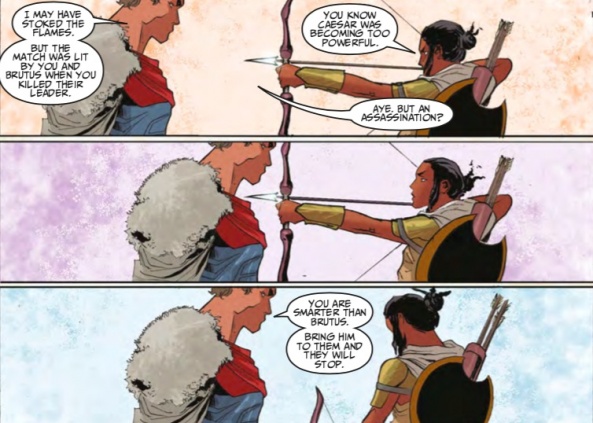
By the time she met back up with Brutus and Cassius after evading the authorities yet again, Aya had had quite enough of Brutus’ warmongering. His decision that they would have been better off having killed Mark Antony before he had riled up the mob in the first place seems to be the last straw for Aya actually following his lead into battle.
In hindsight, using “the Roman way” of handling things was probably the stupidest possible solution he could have come up with. The only thing that the Romans have proven is that they love spectacle, they love the blood of it all, they react most strongly to public displays of brutal violence, which is part of why they loved General Gaius Julius Caesar so much. By following the lead of that mentality, all Aya and the Hidden Ones actually did was feed into the same cycle of violence that allowed his rise in the first place, and she seems well aware of her errors.
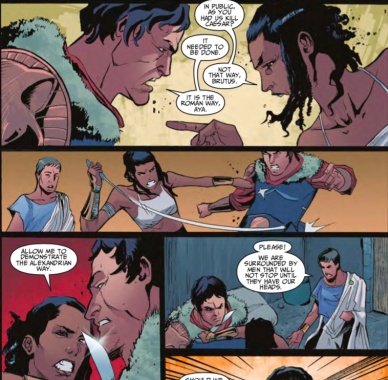
All things considered, she was probably relieved to learn that Brutus would be leaving Rome for Crete in accordance with his visions, though taking Cassius with him was probably not a good thing for her. Of course, she will survive, but this will likely be the last time they ever see each other, given the suicides to occur in only a few years.
Still, she’ll definitely have her hands full trying to reestablish some semblance of peace in Rome, as impossible a goal as it seems.
Assassin’s Creed: Uprising #10

That said, he does seem to have some semblance of decency under his cult mentality, given he warns My’shell about the incoming Instruments to allow her time to escape.

Jasdip seems to be well aware of how to take advantage of someone using the Koh-i-Noor, at least for a human. Given that all humans seem capable of is a collection of illusions, and he appears to have high-tech goggles able to see through that, he was able to separate Charlotte de la Cruz from the crystal.
Of course, with how things have been going, the Instruments don’t really have much reason to keep to their shadow war. Juno’s resurrection is two days away, perhaps less. Answer to heightened animosity and the alliance between the Assassins and the Templars?
Mortar shelling. Immediately.
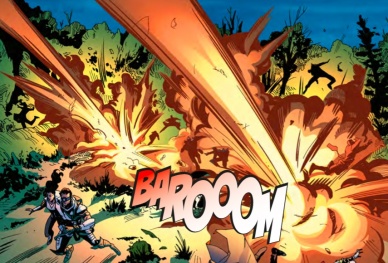
The male of the old guardians left by Ignacio Cardona still had some fight left in him, leading to a pretty impressive way to go out. How exactly can you beat literally walking out of the flames that could kill you after horrendous torture and still being able to fight back against a more-or-less full strength Instrument?
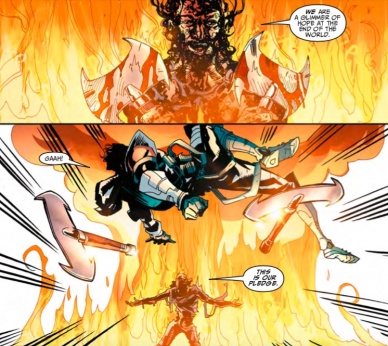
The fact that Galina and Berg are teaming up is still amazing, and no less so when the latter chucks his Templar pin, the Black Cross’s apparent weapon of choice since at least the time of Albert Bolden, to grievously injure Jasdip and save Char’s life.
Continued below
Back with Guernica and My’shell, the former seems to be on the way to, if not turning against the Instruments, certainly not being as much on their side as he used to be, given they had plans to execute him for failing to protect his status as a mole. Could My’shell be a ticket to him turning toward the side of humanity over the Instruments’ lack of faith in their own species?
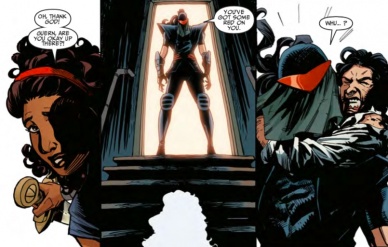
With the battle in Spain over, Jasdip managed to escape with the Koh-i-Noor by helicopter. Galina notes that the crystal will grant Juno control over all of the other Pieces of Eden and allow her to bend them to her will (likely how the apparent telekinesis worked in the flashforward last issue). Still, the situation has gotten so dire that Berg is willing to give up his one last card and let them in on the Phoenix Project itself, including its location, something they’ve been looking for since finding out about it back during the present day portions of Assassin’s Creed: Unity. How far is he willing to break ranks? After all, the Phoenix Project was more or less completely commandeered by the Instruments through Violet Da Costa, not that he knows of that yet.
Speaking of the Templar mole herself, Da Costa is at the aforementioned facility. Álvaro Grammatica doesn’t seem to even realize that the plans of the Phoenix Project were being used by the Instruments from the start, and seems to see them as backward fanatics more than anything else despite the very living “goddess” Juno in his computers.

The actual ability to transfer her to the body to come, which was accelerated by modifying and making use of a Shroud of Eden to be an “amniotic sac,” is rather impressive and swift, at about twenty-four hours, but what takes so long on the front of the transfer itself? If Resurrection Day is in two days, and the body is to be matured in one, will it take another full day to transfer her over? Not exactly improbable, but seems a bit odd.
That said, the actual method by which Grammatica obtained the Isu cells needed was… less than ideal, taken from Elijah, Desmond Miles’ illegitimate son.

… what is this guy even a doctor in? He’s clearly not a medical one, and that’s likely to bite him if Elijah switches sides.
Nearing our finale even further. Only two more issues of each of these comics to go.






